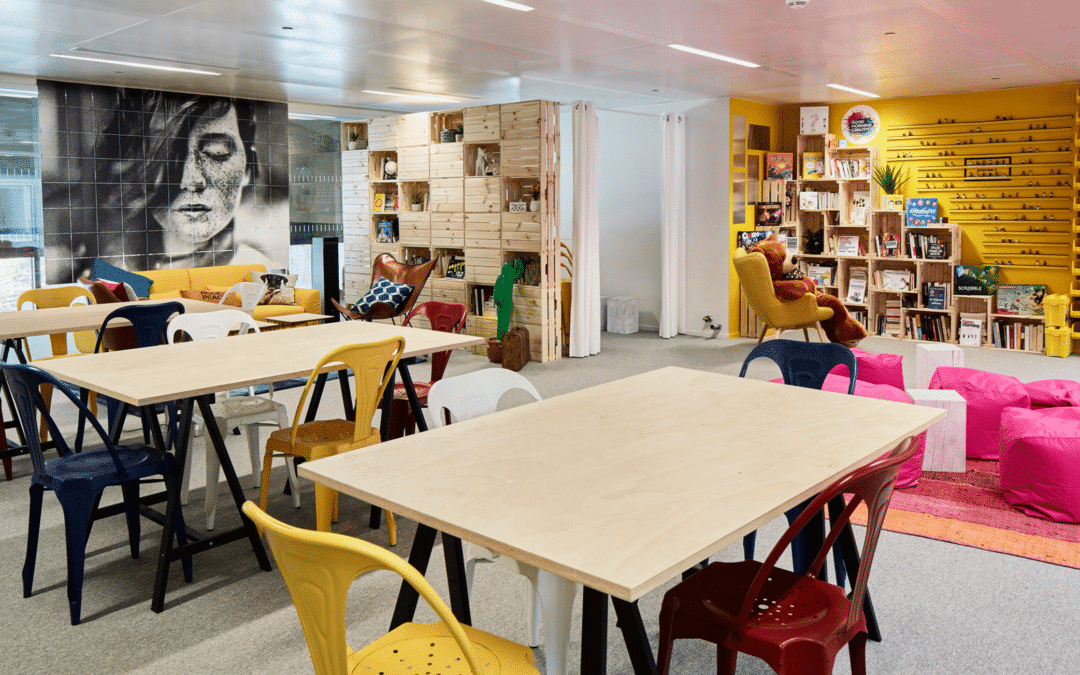With the latest health crisis, employees are increasingly looking for ways to upgrade their skills in order to renew and adapt. Companies must therefore innovate in the area of training to meet these searches and needs to continue to attract and retain talent. But what do employees really expect in terms of training?
In this article, we suggest some innovative ways to effectively support your employees in their professional development.
With a significant increase in the challenges of employability and employee career paths, today’s organizations need to be constantly proposing innovative solutions and tools.
55% of employees consider that to acquire new skills, it’s easier to change companies; relatedly, they report that their current employers don’t give them enough scope to develop new skills. improve their skills. Thus, the following question can be asked: what do employees want?
On the one hand, companies have a greater interest in innovating skills upgrading and retraining their employees.
On the other hand, the recent health crisis – which has left many brands still reeling today – has prompted them, and their employees, to rethink and re-envision training (in the broadest sense) in order to renew themselves, but also to adapt.
Training is therefore one of the solutions: it helps to improve the company’s performance. knowledge, know-how and interpersonal skills, and to develop the skills of our teams. This boosts the competitiveness of organizations and increases their outreach. But how do you attract and retain new talent via the training ?
Training through adaptive learning
After its first applications in higher education, adaptiveadaptive learning oradaptive learning began to gain ground in the late 2000s; historically, this method harks back to the so-called “non-computer era” and to another school learning method: private tutoring.
Benjamin Bloom, like “many twentieth-century psychologists, extolled the merits ofpersonalized, face-to-facelearning as a more effective method than traditional teaching”.
In 2015, this approach, “designed to offer a learning experience that is both individual and progressive“was still in its infancy.
Since the pandemic,adaptive learning , which brings together a range of tools – big data, artificial intelligence, machine learning – and is based on research and work in neuroscience and cognitive psychology, has become much more prevalent in companies.
At a time of training evolution – from individualization just a few years ago, to hyper-personalization today – this approach enables data to be collected and analyzed in a way that is relevant and useful to the customer. Training Managers and HR Directors.
The predictive analysis of this data enables the training gain in efficiency thanks to statistical deductions, by being able to propose the most appropriate courses for a given level.
There are 2 “types” ofadaptive learning:
- Macro Adaptive Learning:
The latter is concerned with the adaptability of the Training on a course in its entirety.
Today, it is represented by organizations such as Domoscio in France, Knewton (Wiley) in the UK and in the US, but also by agencies (Didask, Teach Up, Woonoz, etc.)
- Micro Adaptive Learning:
This variant is today the one embedded in many Learning Management Systems (LMS) (RiseUp, Syfadis, Dokeos, Litmos) and is very much proposed by these same agencies or via solutions like 1Minute, Beedeez.
It pushes granularity and focuses on what is found in each training brick or module: these tools encourage “memory anchoring”, also combating the forgetting curve.
It is important to note thatadaptive learning is not THE solution, but a tool that combines support and to a need for personalizationto ensure pedagogical success and, consequently, the successful skills enhancement of users enrolled in a course of this type. of this type.
To anticipate the recruitment challenges of tomorrow, it is essential to develop solid adaptation strategies. In our dedicated article, you’ll find the keys to adapting as a recruiter and remain effective in a constantly changing environment.
The gamification of training
To maintain the attention and desire of talented people, and attract new, skilled employees, companies can also capitalize on gamification of their training courses.
With gamification of training, we use the power of games in a context other than entertainment. Used in marketing and communications, the gamification in training corresponds to a set of playful mechanisms designed to “gamify” learning content.
The objectives are multiple, with a view to personalizing the relationship with the training and optimize retention rates.
For example, “making training fun allows :
- Improving learner engagement by capturing their interest;
- Enriching the memorization process for better adherence by employees;
- and ultimatelyimproved learning.
In short, the gamification of training can be an effective way of making learning more engaging and improving knowledge retention. And in recent years, the medium that has been particularly popular as a vehicle for this gamification is, of course, the cell phone.
Using mobile learning to train
The mobile learning (also known asM-Learning“) is emerging with the exponential growth in the use of smartphones in everyday life, during a recent phase of development of training accessibility for user-learners.
One of its starting points (and one that didn’t just concern the In 2009, Xavier DALLOZ invented and registered the neologism “mobiquité” (a fusion of the words mobility and ubiquity), flanked by its long acronym, ATAWAD: AnyTime, AnyWhere, AnyDevice, or the ability of a user “in a mobile situation to connect to a network without constraint of time, location or terminal “6.
In recent years, the letters A and C (for Any Content) have been added – giving ATAWADAC – to signify the possibility of accessing any content.
The mobile learning brings together tools and solutions (native applications, web-applications, platforms) that support learning via mobile devices (computers, tablets or smartphones). The advantage is its ease of use: you can be trained whenever you want in the place of your choice. The mobile learning solutions are well known for their use of gamification (Beedeez, Teach on mars, Sparted, etc.).
They are also developing via the emergence of collaborative games which are now part of the social learning.
Training and interacting with social learning
The social learning with, for example, the advent of the Learning Experience Platform (LXP).
The COVID-19 pandemic has forced organizations training is the main sector of activity, or start-ups in the NTIC sector, to recreate social links where there were hardly any left.
For example, the RATP allows knowledge to be shared in video format via tutorials.
This sharing is done with the Beedeezwhich allows employees to rank each other to stimulate participation; a player in the banking sector offered its employees an interactive course in the form of a game as part of the presentation and adoption of a new business tool; another banked on the combination of “ludification-mobile-memory anchoring” as part of the launch of its CFA, to offer its work-study students a new way of learning in a post-Covid-19 era.
Finally, it’s worth noting that social learning is a practical, digitalized extension offormative interaction, which we link to peer-to-peer learning, in which “interactions based on positive interdependence are proving to be a valuable tool, noting, among other things, that they are based on ‘cooperative learning devices'”.
Immersive learning
Immersive learning is a method in which learners personalize their learning experience through virtual or augmented reality.
This active teaching method concretely engages the employee by plunging him or her into the heart of the action in a virtual universe, but close to his or her professional environment. As you can see, being immersed in a virtual space can enrichlearning by bringing a cognitive aspect, but also by integrating a sensory aspect that is essential in many situations in the world of work.
The advantages of virtual reality have been demonstrated in HSE (health, safety and environment) training, for example. Work on pedagogical innovation and its artifacts has demonstrated the benefits of gamification, which is more easily integrated with VR, or how its use – which has sometimes become a prerequisite in the design phase – in training courses is highly relevant (changing levels, accessing a new mission, entering a new episode) and thus contributes to the learner’s success and skills development.
By usingimmersive learning, companies can offer a more engaging and relevant learning experience for their employees. By immersing them in virtual environments close to their work environment, learners can acquire practical and sensory skills that are essential for their professional development. Immersive learning can thus help companies to retain, attract and develop talent by offering more effective and engaging training.
If you’d like to find out more about the subject, we invite you to read our dedicated article : Metavers for training
The learning employee
This point is closely linked to the “learning company“: at SQORUS, thelearning company is :
” An organization that knows how to adapt and change, to welcome and make experimentation, learning, collaboration, and the right to make mistakes part of its culture. It also integrates innovative mechanisms into its DNA and leverages its resources around its members and partners. “
With products and services becoming more and more ephemeral, the organization must innovate or risk being overtaken by its competitors. One of the levers is therefore to involve all the teams in this reflection. Thelearning organization is designed to be a flexible, efficient and fast way of achieving this, and of anticipating new opportunities.
The aim here is to provide the employee with a set of relevant elements enabling him or her to train regularly at their own pace over the period of their choice.
Various tools can thus enable employees to develop your skills :
- A wide catalog of e-learning training courses (classroom, distance, hybrid) in the form of a library on a variety of topics.
- Feedback on different projects through collaborative sharing with teams
- Setting up a mentoring system totransfer knowledge
- Allow the employee to step out of the box, to make mistakes from which they will learn
Curiosity is an essential element to stimulate thedesire to learn. “ Curious employees perform better when it comes to solving problems, because they have a greater capacity to think of alternative solutions and to question the way they operate and think.” – 20208.
These few examples require companies to free up time for employees to develop new skills. Moreover, it is important to value these achievements and listen to the proposals.
By adopting a learner-employee approach, the company can ensure that its teams continue to develop their skills, while stimulating their motivation and commitment.
By enabling them to train regularly and at their own pace, the company creates an environment conducive to innovative learning, while encouraging curiosity and initiative.
This enables the company to attract and retain the best talent, while anticipating future opportunities.
” An innovation is a new or improved way of creating value for customers, for users, for the entity behind the innovation and for society. ” – Garel & Mock, 2012, 2016.
Conclusion on training with incremental innovation to attract talent
In conclusion, training is certainly a strong lever of attractiveness, but it’s not the only one.
It will enable you to build employee loyalty through a career plan defined with them.
Indeed, your potential employees will attach more importance to a position that will enable them to evolve over time, and to further develop their skills.
In a changing world, it is all the more necessary to continue innovating in this recurrently questioned disciplinary field, that is training.
So, without necessarily being disruptive, you can choose to innovate incrementally, with the aim of offering a new product or service. efficient learner experience than successful change management.
If you too would like to reinvent training, SQORUS, a Council specialized in digital transformation, is used to supporting companies of all sizes and in all sectors, thanks to its LAB, which constantly monitors innovations.
Contact
A project? A request?A question?
Contact us today and find out how we can work together to make your company’s digital future a reality.













